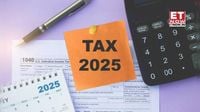As the new financial year begins on April 1, 2025, significant changes in income tax rules and other financial regulations are set to impact millions of taxpayers across India. Finance Minister Nirmala Sitharaman's Union Budget for 2025-26 introduces revised income tax slabs, amendments to existing tax rebates, and new regulations affecting digital payments and pensions.
One of the most notable changes is the increase in the basic exemption limit from Rs 3 lakh to Rs 4 lakh. This means that individuals earning less than Rs 4 lakh between April 1, 2025, and March 31, 2026, will not be required to file income tax returns. This adjustment is expected to benefit a large segment of the population, easing the tax burden on lower-income earners.
The new income tax slabs under the revised tax regime have been designed to provide more relief. Individuals with a net taxable income of up to Rs 12 lakh will not need to pay income tax, effectively allowing those earning up to Rs 12.75 lakh (including the standard deduction of Rs 75,000) to benefit from tax exemptions. For taxpayers with a net taxable income of Rs 12 lakh, the changes will result in tax savings of Rs 83,200, including cess, starting from April 1, 2025.
In addition to changes in tax slabs, the government has increased the tax rebate under Section 87A, which will now allow more individuals to qualify for zero tax. Previously, a rebate of Rs 25,000 was available for taxpayers with a net taxable income of up to Rs 7 lakh. Now, this rebate has been adjusted, making it easier for lower-income earners to benefit.
While the new tax regime presents attractive options for many, some taxpayers may still prefer the old tax regime due to the availability of deductions and exemptions that can lower their taxable income. The old tax regime retains its appeal for those who claim many deductions, such as House Rent Allowance (HRA).
In addition to income tax changes, the financial year 2025-26 also brings updates affecting other areas of personal finance. For example, the limit for tax deducted at source (TDS) on dividend income has been raised from Rs 5,000 to Rs 10,000, benefiting equity and mutual fund investors. Similarly, the TDS exemption limit on bank interest has increased from Rs 40,000 to Rs 50,000, providing relief to fixed deposit and savings account holders.
Another significant change is the introduction of the Unified Pension Scheme (UPS) for government employees who joined after 2004. This scheme will provide an assured pension of 50% of the last salary, along with a minimum monthly pension of Rs 10,000. This shift is expected to benefit approximately 23 lakh central government employees.
Moreover, the new financial year sees increases in various expenses. Toll taxes on national highways have risen by approximately 3%, affecting routes such as the Delhi-Meerut Expressway and the Delhi-Jaipur Highway. For instance, the toll for heavy vehicles on the Delhi-Jaipur Highway will increase by Rs 5, while the Meerut toll from Sarai Kale Khan has gone up from Rs 165 to Rs 170.
There are also slight increases in the prices of essential medicines for serious conditions, including painkillers and antibiotics. Additionally, the prices of natural gas have risen by 4%, leading to increased costs for CNG and power generation, although the price of a 19 kg commercial LPG cylinder has been reduced by Rs 41. The new rates for a 19 kg commercial LPG cylinder are Rs 1,762 in Delhi, Rs 1,872 in Kolkata, Rs 1,714.50 in Mumbai, and Rs 1,924.50 in Chennai.
In the realm of digital payments, the National Payments Corporation of India (NPCI) is implementing new guidelines to enhance UPI security. Starting April 1, banks and UPI apps will be required to update users’ mobile numbers weekly, and explicit consent will be needed for transactions to prevent errors due to incorrect numbers.
Furthermore, the Goods and Services Tax (GST) portal will now require mandatory multi-factor authentication (MFA) for users logging in. E-way bills can only be generated for base documents not older than 180 days, which is expected to streamline the process and enhance security.
As these changes take effect, individuals are encouraged to reassess their financial plans. Whether you are a salaried employee, an investor, or a pensioner, understanding these new rules will be crucial for navigating personal finances in the year ahead. From tax savings to increased expenses, the adjustments made by the government are designed to provide relief while also ensuring the sustainability of the financial system.
In summary, the beginning of the financial year 2025-26 marks a pivotal moment for taxpayers and consumers alike, with significant changes across various sectors. As citizens adapt to these new regulations, it remains essential to stay informed about how these adjustments will affect personal finances and long-term financial planning.






